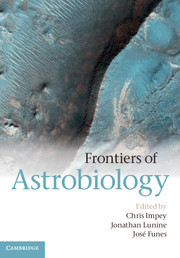Book contents
- Frontmatter
- Contents
- List of contributors
- Part I Introduction
- Inauguration of the Study Week on Astrobiology
- 1 Astrobiology – A New Synthesis
- Part II Origin of Planets and Life
- Part III History of Life on Earth
- Part IV Habitability of the Solar System
- Part V Exoplanets and Life in the Galaxy
- Index
- Plate Section
Inauguration of the Study Week on Astrobiology
from Part I - Introduction
Published online by Cambridge University Press: 05 December 2012
- Frontmatter
- Contents
- List of contributors
- Part I Introduction
- Inauguration of the Study Week on Astrobiology
- 1 Astrobiology – A New Synthesis
- Part II Origin of Planets and Life
- Part III History of Life on Earth
- Part IV Habitability of the Solar System
- Part V Exoplanets and Life in the Galaxy
- Index
- Plate Section
Summary
It is with great pleasure that I welcome all the distinguished scientists convened here, at the invitation of the Pontifical Academy of Sciences, to discuss a theme that is as new as it is difficult and fascinating: Astrobiology. It is a field which requires a range of all but the most profound of scientific knowledge, as well as highly refined research techniques, and it means often proceeding on the basis of scarce evidence and formulating hypotheses requiring strict verification, which in turn can be diversely configured. It means resorting to results of research based on extreme aspects of the possibility of life on Earth, and to study how to verify its presence on other planets or exoplanets. It means – at its limit – studying if and how one could verify the existence of extraterrestrial forms of intelligence and how to enter in contact with them. This is a task that demands scientific integrity, not to be confused with science fiction.
In your study, which represents, I would say, an intense and indispensable case of vast multidisciplinary research, I don't doubt that you will find yourself accompanied and stimulated by that human atmosphere of collegiality and friendship offered by the Pontifical Academy of Sciences.
- Type
- Chapter
- Information
- Frontiers of Astrobiology , pp. 3 - 4Publisher: Cambridge University PressPrint publication year: 2012

